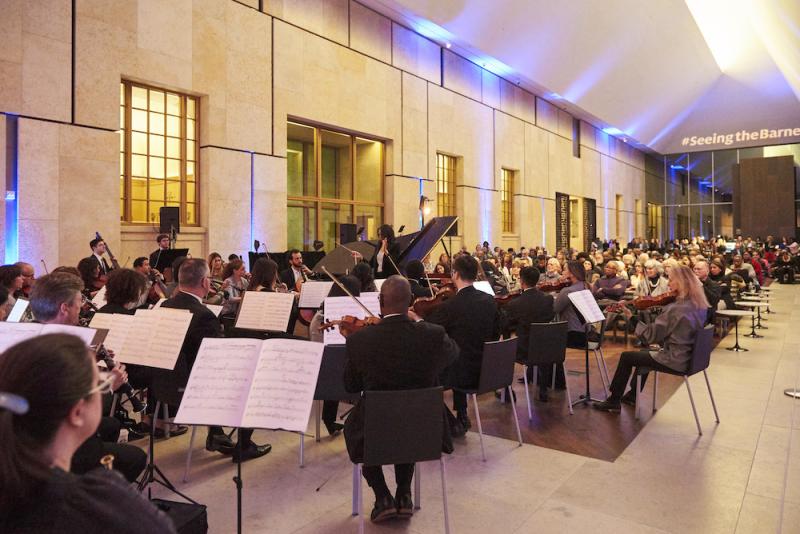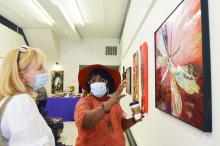ARP Grant Spotlight: Black Pearl Chamber Orchestra (Philadelphia, PA)

Founder and Conductor of Black Pearl Chamber Orchestra Jeri Lynne Johnson leads the orchestra in a performance at the Barnes Foundation. The orchestra was invited to perform at a Barnes Foundation's First Friday Event in celebration of Black women in classical music. Photo by Natalie Piserchio
Philadelphia-based Black Pearl Chamber Orchestra is a performance group that embraces cultural diversity at every level from its musicians and board to staff and repertoire. Artistic director Jeri Lynne Johnson founded the organization in 2009 with an emphasis on social justice, community engagement, and authentic diversity.
The orchestra’s name refers to the precious gem and how it is made. A grain of sand inside an oyster gets coated in layers of mother-of-pearl, easing discomfort for the mollusk while creating something beautiful. “The orchestra,” said Johnson, “is a vehicle for transforming grit into grace.”
Black Pearl hires world-class Latinx, white, Asian, and Black musicians to perform on stage, something Johnson says is the simplest and most effective way to create a connection between the orchestra and communities of color in Philadelphia.
“It is really important for me to show people through representation in the orchestra that this art form is truly for everyone,” said Johnson.
In Philadelphia, where African and Latin Americans represent over 57 percent of the population, traditional classical music organizations have left diverse communities by the wayside. Black Pearl has addressed this by developing InReach programs that facilitate a more reciprocal relationship with the community.
For example, iConduct! gives Philadelphians a chance to receive a conducting lesson from Johnson and lead the orchestra themselves. The idea traces back to when Johnson was told she didn’t look the part of an orchestra conductor. She resolved to help make sure others did not feel that same criticism. During the event’s first iteration, audience members learned about the role of a conductor and tried their hands at leading a performance of Beethoven’s Symphony No. 5. Black Pearl has also started Orchestrating Youth Leadership, a workshop for middle and high-school students to master executive functioning skills (such as impulse and emotional control, flexible thinking, planning, and prioritizing) by learning the art of conducting.
The orchestra’s hallmark InReach efforts came under threat at the beginning of the pandemic, recalled Johnson. “I jumped into action mode and all I could think was ‘we have to survive,’” she said. As in-person performances quickly came to a halt in March 2020, Johnson saw her musicians eager to perform and performing for free online. Johnson saw this as a sign of trouble.
“You know things are bad when artists begin to give away their work for free,” she said.
During the pandemic, Johnson says she also became critically aware of the role an audience plays during a performance, how much an orchestra feeds off of that energy, and how eager she is to continue that relationship in person.
“The pandemic laid bare the real necessity not just of having performances in people's lives that they can go to and just sit in as the audience but, but the act of creating of making art, said Johnson, “Creativity is a is a human right. And I think it's fundamental to democracy.”
Johnson applied for grants and re-hired members of her orchestra through their respective collective bargaining agreements. Navigating the funding field allowed Black Pearl to earn a CARES grant from the NEA, and then support from the NEA’s American Rescue Plan grants. The NEA funding has allowed Black Pearl to keep musicians employed and as the pandemic continues, to hold safe in-person events.
“The NEA really raised the bar with this round of funding, and I was so pleased to see the diversity of organizations from across the country that won and get to know some of the really wonderful work that’s being done in music across this country. The [Arts Endowment] is setting the example of how philanthropy or grant making is such a critical partner in ensuring that diversity becomes a fundamental part for the arts ecosystem,” said Johnson.





